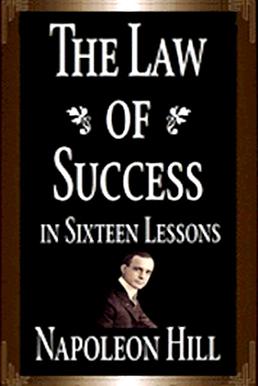The Law of Success
The Law of Success is a book written by Napoleon Hill and first published in 1928. It is a multi-volume course that outlines the philosophy of achievement that Hill developed over 20 years of research and interviews with over 500 successful individuals. The Law of Success is considered one of the foundational works in the self-help and personal development genre.
Overview[edit | edit source]
The Law of Success is divided into 16 lessons, each focusing on a principle of personal achievement. These principles include the Master Mind, a concept that involves coordinating knowledge and effort between two or more people to achieve a common goal; self-confidence; the habit of saving; and the golden rule, among others. Hill's philosophy emphasizes the power of personal belief and the role of positive thinking in achieving success.
History[edit | edit source]
Napoleon Hill began his research into the causes of success and failure after being commissioned by Andrew Carnegie, one of the wealthiest men of his time, to interview successful individuals and distill a formula for success that could be used by the average person. Hill's work on the project spanned over two decades, during which he interviewed many of the most successful individuals of the early 20th century.
Publication[edit | edit source]
The Law of Success was originally released in 1928 as a set of eight volumes. Later editions combined these volumes into a single book or a series of books. The work has been republished multiple times and remains in print today, attesting to its lasting popularity and influence.
Principles[edit | edit source]
The 16 principles of success outlined in The Law of Success are:
- Definite Chief Aim
- Self-Confidence
- Habit of Saving
- Initiative and Leadership
- Imagination
- Enthusiasm
- Self-Control
- Doing More than Paid For
- A Pleasing Personality
- Accurate Thought
- Concentration
- Cooperation
- Failure
- Tolerance
- The Golden Rule
- The Master Mind
Each principle is designed to build upon the others, providing a comprehensive guide for personal development and success.
Impact[edit | edit source]
The Law of Success has had a significant impact on the field of personal development and self-help. Its principles have been incorporated into countless programs, books, and seminars around the world. Many of today's motivational speakers and authors cite Hill's work as a major influence on their own philosophies and teachings.
Criticism[edit | edit source]
While The Law of Success has been praised for its comprehensive approach to personal development, it has also faced criticism. Some critics argue that the book oversimplifies the complexities of success and fails to adequately address the role of external factors. Others have criticized it for its emphasis on material success.
Legacy[edit | edit source]
Despite these criticisms, The Law of Success remains a cornerstone of the self-help genre. Its principles continue to inspire and guide individuals seeking to improve their lives and achieve their goals. Napoleon Hill's work has paved the way for future generations of self-help authors and continues to be a source of motivation and inspiration.
Search WikiMD
Ad.Tired of being Overweight? Try W8MD's physician weight loss program.
Semaglutide (Ozempic / Wegovy and Tirzepatide (Mounjaro / Zepbound) available.
Advertise on WikiMD
|
WikiMD's Wellness Encyclopedia |
| Let Food Be Thy Medicine Medicine Thy Food - Hippocrates |
Translate this page: - East Asian
中文,
日本,
한국어,
South Asian
हिन्दी,
தமிழ்,
తెలుగు,
Urdu,
ಕನ್ನಡ,
Southeast Asian
Indonesian,
Vietnamese,
Thai,
မြန်မာဘာသာ,
বাংলা
European
español,
Deutsch,
français,
Greek,
português do Brasil,
polski,
română,
русский,
Nederlands,
norsk,
svenska,
suomi,
Italian
Middle Eastern & African
عربى,
Turkish,
Persian,
Hebrew,
Afrikaans,
isiZulu,
Kiswahili,
Other
Bulgarian,
Hungarian,
Czech,
Swedish,
മലയാളം,
मराठी,
ਪੰਜਾਬੀ,
ગુજરાતી,
Portuguese,
Ukrainian
Medical Disclaimer: WikiMD is not a substitute for professional medical advice. The information on WikiMD is provided as an information resource only, may be incorrect, outdated or misleading, and is not to be used or relied on for any diagnostic or treatment purposes. Please consult your health care provider before making any healthcare decisions or for guidance about a specific medical condition. WikiMD expressly disclaims responsibility, and shall have no liability, for any damages, loss, injury, or liability whatsoever suffered as a result of your reliance on the information contained in this site. By visiting this site you agree to the foregoing terms and conditions, which may from time to time be changed or supplemented by WikiMD. If you do not agree to the foregoing terms and conditions, you should not enter or use this site. See full disclaimer.
Credits:Most images are courtesy of Wikimedia commons, and templates Wikipedia, licensed under CC BY SA or similar.
Contributors: Prab R. Tumpati, MD

